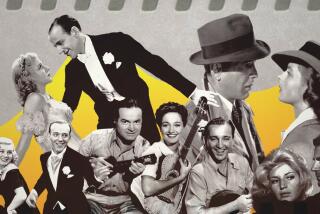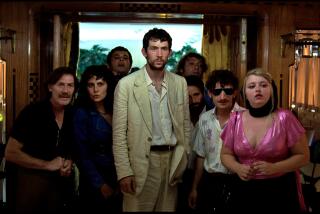‘Swiss Classics’ From UCLA Archive
- Share via
Most foreign-film buffs, who believed that Switzerland produced films only in the early 1970s with the wry, distinctive comedies of Alain Tanner and Claude Goretta, will be surprised to discover that the Swiss have been making films more or less steadily since the silent era.
The UCLA Film Archive’s “Swiss Classics” (1923-45), which commences Saturday at 7:30 p.m in UCLA’s Melnitz Theater, is presenting films of considerable variety, including several masterpieces which surely are all but unknown in America. The films, which have been carefully restored and newly subtitled, are being presented in association with Pro Helvetia, the Arts Council of Switzerland.
Jacques Feyder’s “Faces of Children” (1923)--the series’ first and perhaps finest offering--is quite simply one of the great films about children. Rediscovered only in 1988, it calls attention to the Belgian-born director, best known today for the sly and witty “Carnival in Flanders,” starring his wife Francoise Rosay, who was a glory of the French--and international--cinema for 60 years. (Feyder, who worked mainly in France, also had a stint at MGM, where he directed Garbo in her last silent, “The Kiss,” and also in the German- and Swedish-language versions of “Anna Christie,” her first talkie.)
Rosay does not appear in the film, but she was one of her husband’s collaborators on the script. Set in a quaint 19th-Century Alpine village, it is a timeless and acutely perceived story of an adolescent boy (Jean Forest, who is astonishing in his power) overcome with grief at the death of his beloved mother. His well-meaning but obtuse father (Victor Vina), the village mayor and wealthiest citizen, soon marries a widow (Rachel Devirys) with a daughter about the son’s age. She is kindly but not always sensitive, and the mayor’s son and his younger sister are soon at war with their stepsister.
For its suspenseful climactic sequence, Feyder makes use of his rugged locale during a snowstorm much the way D. W. Griffith handled the famous ice floe sequence in “Way Down East”; “Faces of Children” has been credited with helping bring poetic realism to the French cinema.
Playing with “Faces of Children” is a genuine curiosity, “Misery and the Fortune of Women” (1929), an early talkie deploring the perils of illegal abortion. Sergei Eisenstein, no less, was signed to direct, but he actually had little to do with the film, which was made primarily by his legendary cameraman Eduard Tisse. Although the film does have montages in the Russian style, it is a bore, heavily didactic in the extreme and turned into an anti-abortion tract by its producer.
Screening Sunday at 7:30 p.m. is another film by a Russian director, “The Kidnapping” (1933). Directed by Dimitri Kirsanoff, best known for the landmark French silent experimental film “Menilmontant” (1926), “The Kidnapping” is a romantic tragedy made eloquent not only by a dynamic use of montage but also a moody, aptly jangling score by Arthur Honegger and Arthur Hoeree that still sounds excitingly avant-garde. A handsome but inarticulate young man (Geymond Vital) impulsively abducts a beautiful young woman (French star Dita Parlo) from a distant village, despite the fact that he is engaged to a local beauty (Nadia Sibirskaia, star of “Menilmontant”).
What now what is he to do?
Sadly, he really doesn’t know. As in “Faces of Children,” this film’s awesome Alpine setting provides a dramatic perspective for human vicissitudes.
Playing with “The Kidnapping” is Leopold Lindtberg’s “The Abused Love Letters” (1940), a charming but tedious period piece involving a flirtation between a young schoolteacher (Paul Hubschmid, later the star of Fritz Lang’s 1959 two-part Indian adventure “The Tiger of Eschnapur” and “The Indian Tomb”) and a pretty housewife (Anne-Marie Blanc), married to an exceedingly pompous husband (Alfred Rasser).
Information: (310) 206-FILM, 206-8013.
More to Read
Only good movies
Get the Indie Focus newsletter, Mark Olsen's weekly guide to the world of cinema.
You may occasionally receive promotional content from the Los Angeles Times.










